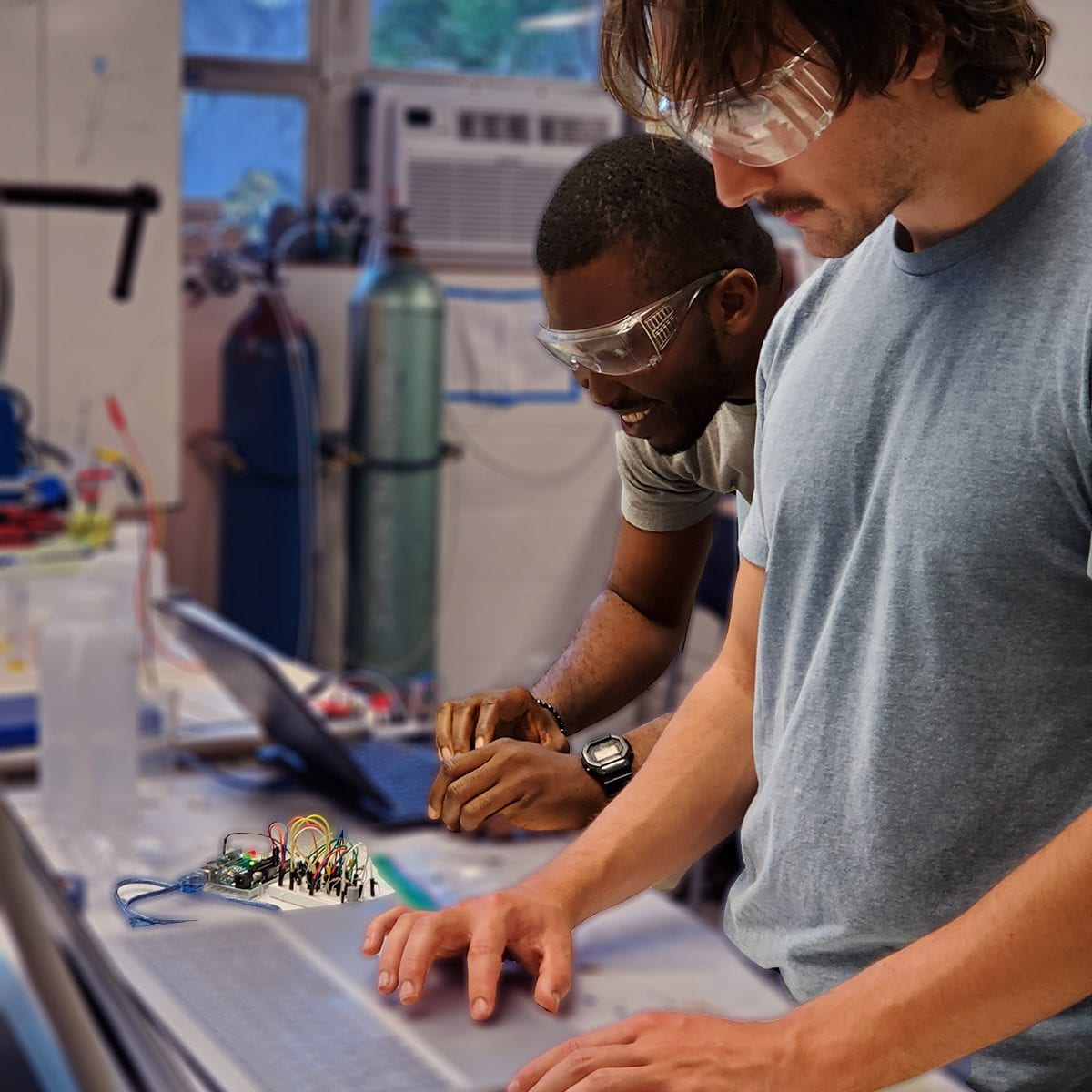Launch your career. Help change the world.
Apply Now: Application for Fall 2024 (Class of 2025)
Electrochemistry underlies technologies critical to avert the worst effects of climate change. Get the knowledge and training needed to help address the world’s biggest challenges! Chemistry, physics, engineering are all appropriate backgrounds – each brings unique, complementary skill sets.
Requirements: Passion for team-driven science and technology development in the area of applied electrochemistry. BS/BA in Chemistry/Biochemistry, Physics, Engineering, or related discipline (other majors, such as computer science or mathematics, could be appropriate, please discuss special situations with our team). Good academic record (please discuss with us for specifics, we look at your entire record, not just GPA). Research experience beneficial, but not required. GRE scores are not required.
International Students: We are happy to work with international students to help them find internships and launch careers in the US or globally as part of this program. There are also opportunities for students to perform internships in academic research environments, complemented with additional graduate-level chemistry/materials-science coursework. The tuition for international students is the same as for domestic students and is listed below.
Background. The University of Oregon pioneered the development of internship-based MS programs starting in 1998. The goal of these programs is to provide real-world knowledge, skills, and experience that allows students to excel landing position, launching their professional career and working in industrial research laboratories. In Fall 2020, the Oregon Center for Electrochemistry launched an MS internship program in Electrochemical Technology. Other existing internship-based MS programs include those housed in the Knight Campus (semiconductors, optics, polymers, bioinformatics and sensors) and the Center for Advanced Materials Characterization in Oregon (advanced materials characterization and analysis). All these programs have exceptionally high rates of internship and job placement (the electrochemistry program currently has 100% placement rate).
Program Overview: The core program consists of 6-months of accelerated coursework (including foundational theory, and team-based applied laboratory work, click on the links in the table below for syllabi) and professional development (leadership, project management, interview skills, team integration) coupled with a 9-month paid internship in industry or national laboratory (2021 average annualized compensation was $75,000, with all students landing internships). The internship placements can be anywhere in the world, although we currently focusing on US-based partners. Information on industry and national laboratory partners is here with internship host expectations here.
The goal is for students to leave the 15-month program with minimal to no debt from their MS studies, an exciting job, and the foundation for a successful long-term career. Students who complete the MS program can also earn their PhD on an accelerated timeline either on the UO campus or at an industry or national laboratory partner, depending on career goals, with all the MS coursework satisfying the PhD coursework requirements in Chemistry.
Need: Science and engineering undergraduates receive essentially no training in electrochemical science and technology despite its critical importance in clean-energy conversion/storage technologies, semiconductor-device fabrication, bio-electronics interfaces, and materials/chemical production. The prevention of corrosion relies on controlling electrochemical processes. Electroplating is used broadly in industries to conformally coat objects and to purify/isolate metals. Battery, super-capacitor, electrolysis, and fuel cell energy storage/conversion technologies all rely on electrochemical science and engineering. Electrochemical sensors are routinely used in biomedical applications, with the most prominent example being the glucose sensor used by diabetics. Electrochemistry is increasingly being applied in organic synthesis in an effort to eliminate the use of highly reactive, dangerous, and expensive reagents. Electrochemical devices are used to measure and probe signals in neuroscience. There is need in established industries for competent scientists and engineers in the area of electrochemical technology – in fact DOE has recently recognized the need for workforce development specifically in this area as part of Energy Storage Grand Challenge.
Students: The Oregon Center for Electrochemistry’s masters-level internship program attracts chemistry, physics, biology, and engineering students and provide nationally unique training including rigorous foundational electrochemical theory, team- and inquiry-based laboratory work, numerical simulation and engineering of electrochemical systems, and experience tackling industry-sponsored, team research projects. Concepts in data analysis and statistical design of experiments (e.g. MatLab, Python, JMP) are incorporated throughout the coursework. Electrochemical content is coupled with professional and communication skills development, as well as elective coursework focused on target career areas (materials science, bio-medicine, energy, etc.). After 6 months of accelerated immersion coursework and a 9 month industry internship, graduates are ideal “T-shaped” employees that can tackle complex challenges facing engineered electrochemical systems using rigorous experiments, efficient data analytics, and computer models, while optimally working in team environments. Such graduates provide substantial value to industry as employees compared to the existing candidates who generally have little or incomplete training in electrochemical science and are often not adept at using modern experimental design, data analytics and computation tools.
Map of Students and Industry Partners
6-month Coursework Track
Total required credits: 55
| Fall | Winter | Spring | Summer | Fall |
| Advanced Electrochemistry (4 cr.)
Electrochemistry Laboratory (2 cr.) Electrochemical Simulations (2 cr.) Elective Graduate Level Course in Chemistry, Physics, or Biology. (4 cr.) Professional Development (1 cr.) |
Electrochemical Engineering (4 cr.)
Electrochemical Device Laboratory (4 cr.) Electrochemical Projects Laboratory(4 cr.) OR Elective Graduate Level Course in Chemistry, Physics, or Biology. (4 cr.) |
Paid Internship (10 cr.)
Internship report. Site or video conference visit.
|
Paid Internship (10 cr.)
Internship report. Site or video conference visit.
|
Paid Internship (10 cr.)
Internship report. Site or video conference visit.
|
9-month Coursework Track (click links for sample content)
Total required credits: 55
| Fall | Winter | Spring | Summer | Fall | Winter |
| Advanced Electrochemistry (4 cr.)
Electrochemistry Laboratory (2 cr.) Electrochemical Simulations (2 cr.) Professional Development (1 cr.) |
Electrochemical Engineering (4 cr.)
Electrochemical Device Laboratory (4 cr.) Independent research in electrochemistry (1 cr.) |
Electrochemical Projects Laboratory(4 cr.)
Elective Graduate Level Course in Chemistry, Physics, or Biology. (4 cr.) Independent research in electrochemistry (1 cr.) |
Paid Internship (9 cr.)
Internship report. Site or video conference visit.
|
Paid Internship (9 cr.)
Internship report. Site or video conference visit.
|
Paid Internship (9 cr.)
Internship report. Site or video conference visit.
|
Course Descriptions
- Fall Term. Advanced electrochemistry (CH554, 4 credits). The course covers the fundamentals of electrochemistry and uses the classic text of Bard and Faulkner. Electrochemistry is a field of science that describes the interrelation of chemical and electrical effects. Much of the field deals with describing how chemical changes are caused by the passage of electrical current or how the production of electrical current can be caused by chemical reactions. Electrochemists rely on a foundational understanding of thermodynamics, electron transfer kinetics, and mass transport phenomena – each of which are treated in this course in the context of understanding electrochemical phenomena. The theoretical aspects of impedance analysis, corrosion, and electroplating will also be introduced and electrochemical simulation is used to explore advanced systems. Feedback from industry partners drive curriculum changes.
- Fall Term. Analytical Electrochemistry Laboratory (CH691, 2 credits). This course focuses on typical three-electrode electrochemical experiments and laboratory techniques that form the basis for analytical electrochemistry and for building the basic electrochemistry knowledge and intuition with respect to thermodynamics, kinetics, and mass transport. Laboratory modules focus on voltammetry, electrochemical synthesis via bulk electrolysis, electrodeposition, corrosion analysis, and impedance analysis. Feedback from industry partners drives curriculum changes. Concepts in statistical experimental design, data collection, and data analysis are emphasized using common libraries in Python (Matplotlib, Pandas, NumPy).
- Fall Term. Numerical Simulations in Electrochemistry (CH690, 2 credits). Modern finite element simulation software is widely used in engineering to predict system performance/properties. Students will use industry-standard software, COMSOL, to simulate basic electrochemical cells and devices. This will provide students a technical advantage in the workforce.
- Winter Term. Electrochemical Device Engineering (CH692, 4 credits). This course examines the operational and engineering principles of electrochemical energy storage devices (batteries and capacitors), energy conversion devices (fuel cells, electrolyzers), corrosion, electrodeposition, and electrochemical sensors. The emphasis is on materials and device design based on fundamental chemistry and physics concepts that govern the properties and performance of the materials/devices involved. Specific systems of study will include electrode and electrolyte materials for primary (non-rechargeable) and secondary (rechargeable) batteries including lithium-ion batteries, electrochemical capacitors, proton exchange membrane fuel cells, solid oxide fuel cells, alloy electrocatalysts, mixed ionic-electric conductors, and biosensor development. Feedback from industry partners drives curriculum changes.
- Winter Term. Electrochemical Device Laboratory (CH693, 4 credits). Students work in teams to build a battery, balanced battery pack, electrolyzer, fuel cell, and biosensor device and test their performance and response compared to theory and modeling, applying experimental design and statistical analysis methods. Feedback industry partners drive curriculum changes.
- Winter Term. Applied Electrochemistry Projects (CH694, 4 credits). This course requires students to work in teams and solve open-ended research and development projects in electrochemistry. The research and development projects for the course come from industry partners and academic research laboratories. The output will be a formal report to the industry sponsor or academic publication coauthored by the students. Students have extensive access to state of the art materials fabrication and characterization equipment (http://camcor.uoregon.edu/) in addition to modern electrochemical instrumentation.
Either program of study also must comply with the policies set forth by the Division of Graduate Studies regarding Master’s Degrees and Enrollment and Residency and general Master’s Degree requirements.

